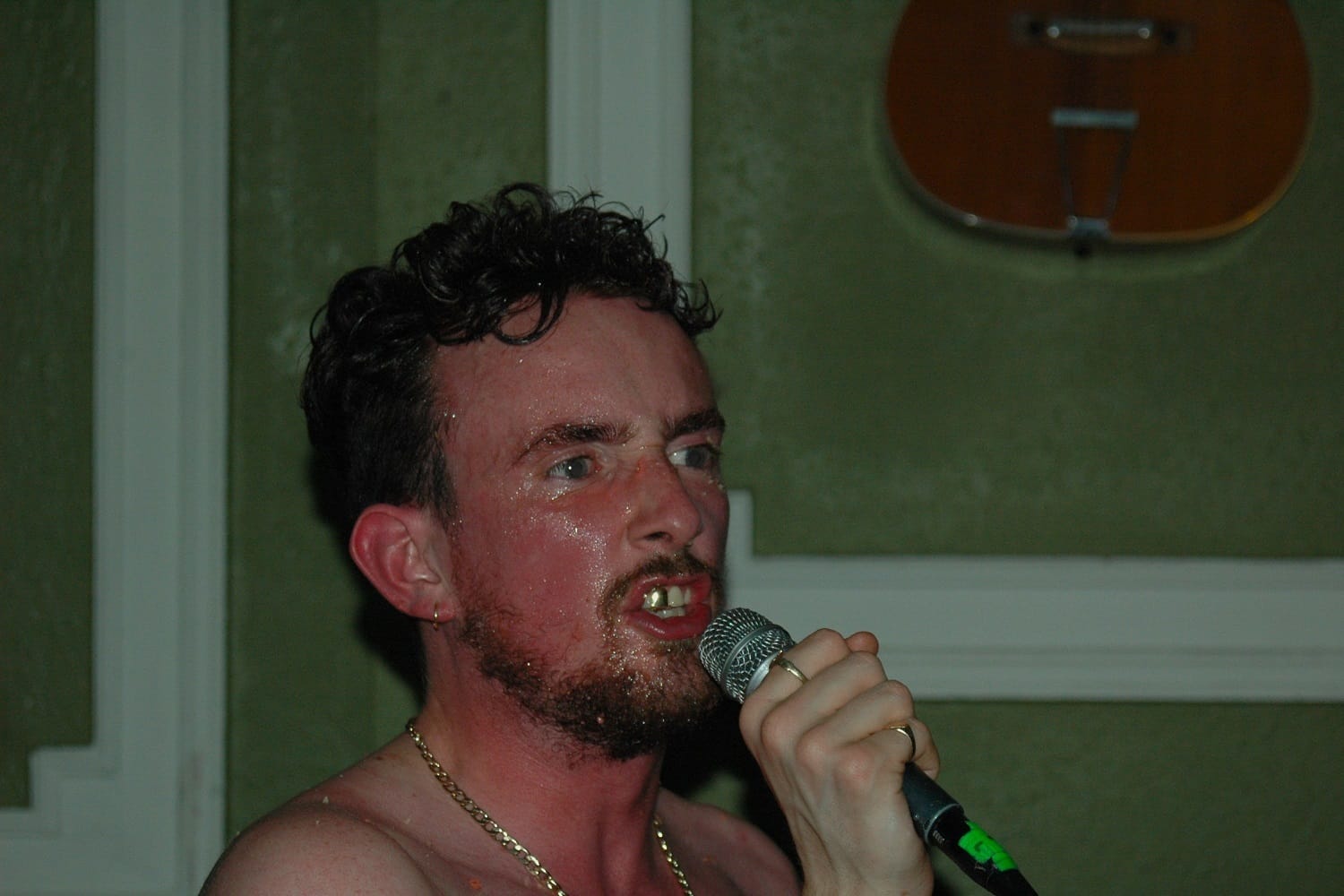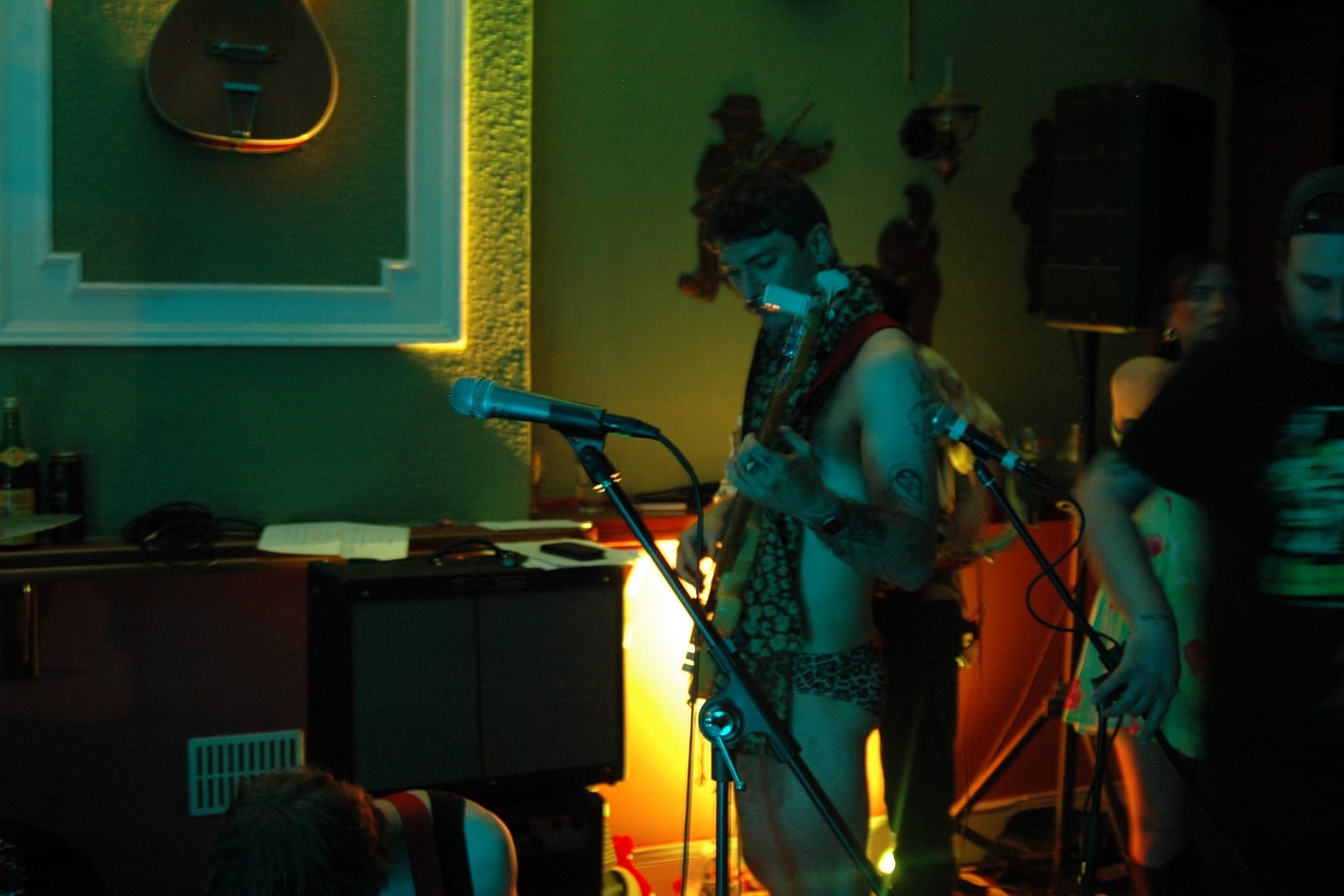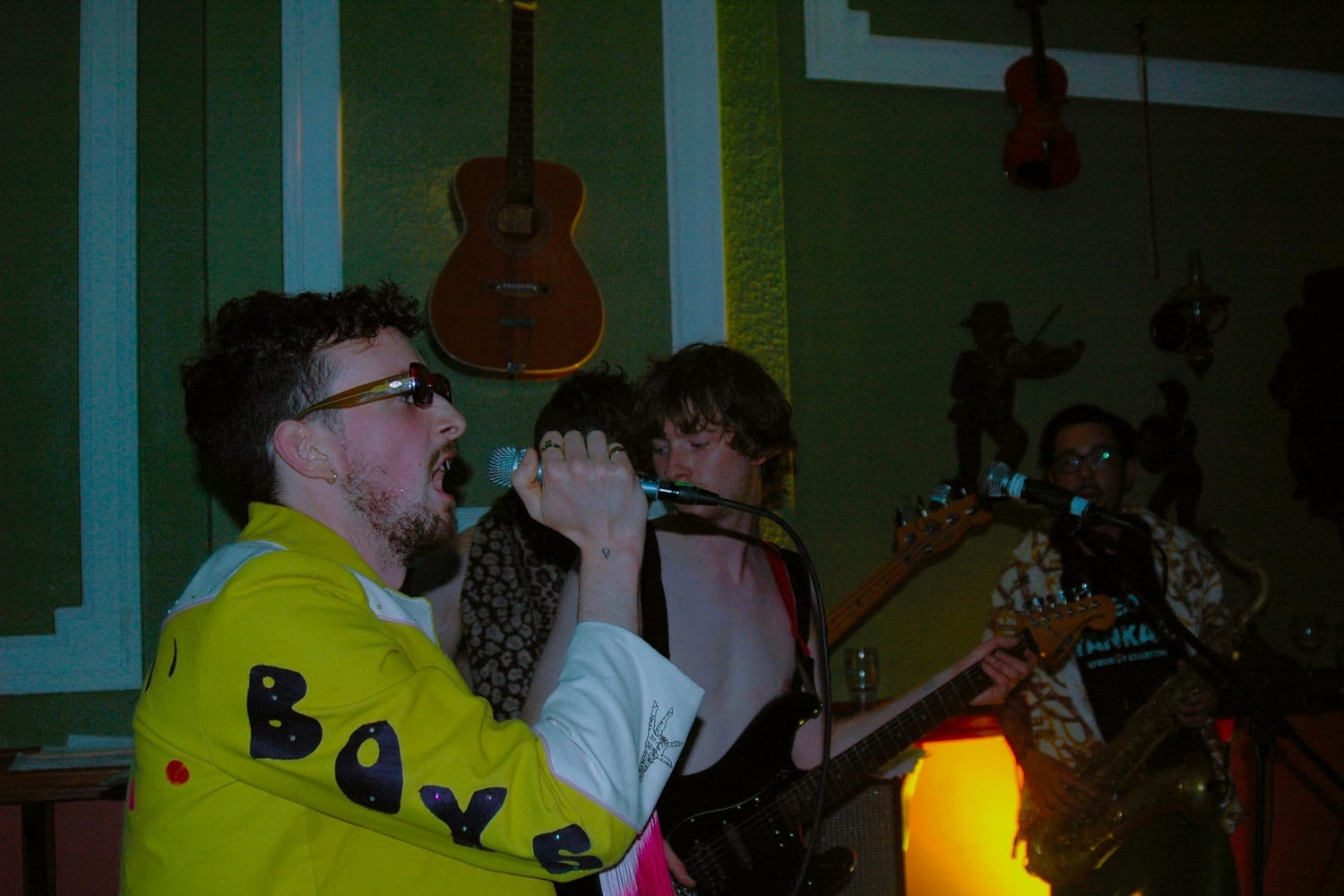What’s the best way to tell area residents about plans for a new asylum shelter nearby?
The government should tell communities directly about plans for new asylum shelters, some activists and politicians say.
For 30 minutes, the band delivered a blistering set of theatrical punk and monstrous rock ‘n’ roll, saturated in sweat, Buckfast Tonic Wine and milk.

Though the sun had gone down, the interior of The Hut on the Phibsboro Road was sweltering.
The first floor of the Victorian pub was packed to the brim by 10.30pm on Saturday night, with the floodlights from Dalymount Park shining through the windows.
In the corner of the stage-free room were five-sixths of the band, the Onion Boys.
Tuning up as the audience chanted their name, they were among the few attendees dressed to accommodate the heat.
Guitarist Alex Moore wore a nylon wrestling singlet. Bassist Robert Mirolo had on less: a leopard print underwear and scarf combination.
After five minutes or so, a voice came from somewhere in the crowd, “Johnny Dublin’s in the house.”
People screamed and shouted in exhilaration as a figure waded through the throng, wearing red sunglasses, a bright yellow suit with tassels on the sleeves, and grinning maniacally to reveal a golden tooth.
Wishing one and all a merry Christmas, the frontman, real name James Carroll-Freeney said, “it’s Christmas somewhere”, as the band rumbled into their opener, the single “Strung Out on Chicken”.
A dark and doomy rockabilly guitar riff crept around a simple, stomping beat, joined by a howling saxophone. Then, in a deep, sinister voice Johnny Dublin growled, “I’ve gone and done it again. I’m in my lemon pyjamas.”
That set the room leaping, shouting and dancing. The floorboards of the late-19th century public house creaked. For 30 minutes, the band delivered a blistering set of theatrical punk and monstrous rock ‘n’ roll, saturated in sweat, Buckfast Tonic Wine and milk.
The band is messy and ramshackle – and unabashedly so, says guitarist Mark Stevens. “We’ve tunes that get dirty and dangerous, but it’s pop music, smelly and sick singalong stuff, because a lot of stuff around is too polished and contrived.”
James Carroll-Freeney is a world apart from his alter ego Johnny Dublin.
Over a pint of Guinness outside McNeill’s on Capel Street, he remembers the aftermath of a recent gig in Leipzig, during which a member of the audience was dismayed to discover he wasn’t this glowering menace off-stage.
“The guy got really annoyed, like really upset,” he says. “But I said, ‘You wouldn’t like me if I was Johnny. I’d actually just be a prick, who wouldn’t talk to you.’”
Whereas Carroll-Freeney is jovial, Dublin is a misanthropic character, at odds with the world. He is a character who is pursuing a 20th-century rock-star fantasy in 21st-century Dublin, Carroll-Freeney says. “He has a shitty flat, because the world he lives in is this one here.”



Dublin and the band the Onion Boys were conceived during the early stages of the first national lockdown by himself and his friend Daniel McIntyre, Carroll-Freeney says.
An actor and filmmaker, Carroll-Freeney had previously played drums in a couple of heavy-metal groups, but the Onion Boys was his first proper foray into music, he says. “It was being in the sun over Covid, saying ‘Let’s make a few tunes with a bit of weirdness.’”
The group was born from an adoration for punk and rock ‘n’ roll, coupled with a desire to combine music with an element of theatricality, he says, pointing to the psychedelic sci-fi band Spudgun. “The first gig of theirs I saw was in 2016, and I really liked the mix of theatre with music.”
The Onion Boys first debuted in May 2021 with the single “Rock Band”, a cacophonous call-and-response between Carroll-Freeney and a wall of guitars, hammering away at a single note.
Comprised of lyrics that satirise contemporary guitar groups, like “End up in Workmans, I’m in a rock band,” and “I live in Dublin, I’m in a rock band,” its release was accompanied by the mission statement they were revolutionising guitar music “by regurgitating the same thing you’ve already heard”.
In early 2022, the band began playing live, with their first gig consisting of Carroll-Freeney on vocals, accompanied by a backing track, he says, laughing. “It was just me on the mic, and Dan pretending to play guitar.”
That April, a full band had been recruited, including bassist Robert Mirolo, also a member of the group SSMMÜTT.
For Mirolo, the group doesn’t necessarily act as a critique of contemporary music, but rather as a response to the narrative of authenticity created by certain guitar bands.
“We love rock, and post-punk, but there’s been a crop of bands where it almost feels like pantomime at the moment of things that’ve happened before,” he says. “It seems like there’s a consensus of, we’ll all agree to dress like we’re Irish in London in the ’80s and pretend to be from that world.”
The narrative Carroll-Freeney creates is one that is fronted by a façade of masculine bravado, but which features an undercurrent of insecurity derived from living precariously in Dublin, he says.
“In this inhospitable, hotel hellscape, we’re talking about, ‘What are we doing? And what are the opportunities?’” he says.
On their latest single, “How to Grow Up (on Tik Tok)”, an upbeat, jangly guitar contrasts the existential turmoil of a chorus, in which he sings, “I don’t really know how to grow up/ I don’t really know if I should be on Tik Tok.”
“It’s so hard to be certain now,” he says. “A part of us just wants kids, but most the time we just end up playing PlayStation or regurgitating fuckin’ rock ‘n’ roll cliches.”
Mark Stevens sits on the couch in his bedroom looking at the three guitars resting on the wall across the room from him.
Before joining the band, he hadn’t the opportunity to play much guitar for years, he says. “I love playing, but I was working my bollocks off for years, and never really had the chance.”
He doesn’t regard himself as the most technically proficient musician, he says. But that hardly matters.
“I love people who haven’t necessarily played, and having friends come back here who’ve never picked up a guitar, showing them how to strum an E chord and then saying, ‘You’re playing music now.’”
Demystifying the idea of making music gives him joy, he says. “I just want to make things people can relate to. Make it relatable, make it fun.”
The band embodied that as they ripped through their set upstairs in The Hut last Saturday. The line between band members and audience seemed to scarcely exist, Stevens says. “It’s so good when you’re playing at eye level.”
From one song to the next, the line-up seemed to change. Friends in the crowd clambered through the dancing mass to play drums or shake a tambourine while hanging off the windowsill.
Someone passed Carroll-Freeney a cupcake, which he smeared on his face. While a guy carried into the venue a litre of Avonmore Super Milk, which slopped everywhere as he drank it from a pint glass.
It was, Stevens says, big, loud, messy and sweaty. “When there’s no stage, it’s just great.”
Get our latest headlines in one of them, and recommendations for things to do in Dublin in the other.